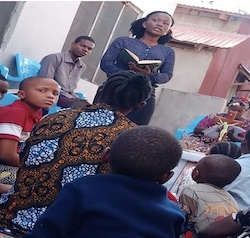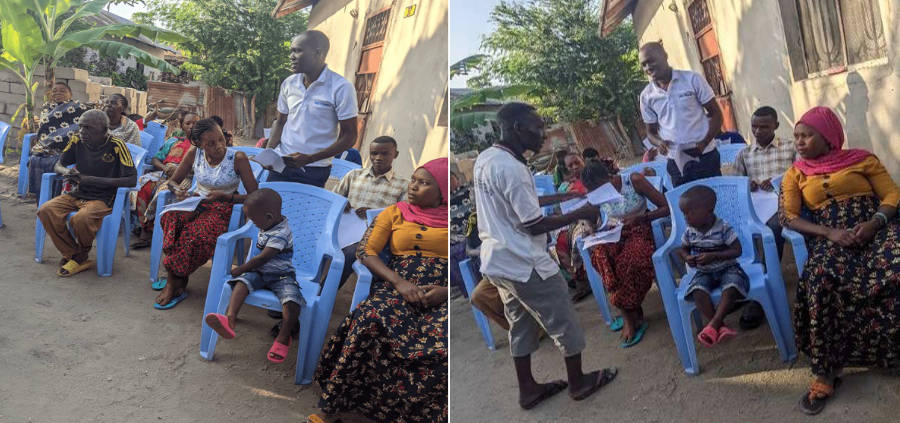Youth Participation in Small Christian Communities in Tanzania: Insights and Recommendations by Jesca D. Massawe and James Alex Mhangwa
This is a condensed version of a research study undertaken by Jesca D. Massawe and James Alex Mhangwa. The full text is available here—Ed.
Small Christian Communities play a vital role in nurturing faith and fostering spiritual growth among believers. Today there are over 195,000 Small Christian Communities in the nine countries of the Association of Member Episcopal Conferences in Eastern Africa (AMECEA). Tanzania alone has over 65,000 SCCs, and Kenya has over 50,000.
Though these numbers are encouraging, there has been a decline in engagement with SCCs in some African parishes. In Tanzania, for instance, the participation of youth in Small Christian Communities is declining despite the country having one of the world’s fastest-growing populations of young people. Of the estimated 60 million people in Tanzania, more than 50 percent are under 18 and over 70 percent are under 30. Adolescents account for over 12 million of an overall population of nearly 60 million, according to the United Nations Children’s Fund (UNICEF).
In attempt to account for this decline, we embarked on a research project to identify barriers hindering youth participation in SCCs in Tanzania. We used structured questionnaires to gather insights from 97 participants in five specific SCCs. The SCCs are part of the Virgin Mary Mother of Our Savior Parish in Dar es Salaam, Tanzania, in the Kipawa Archdiocese. Of the 97 people who responded to our questionnaire, 41 percent were young people under the age of 27.
The main objectives for our study included exploring the reasons why young people choose not to attend SCCs; assessing the level of young people’s engagement and satisfaction with SCCs; evaluating the impact of external influences such as technology on youth participation; and suggesting practical recommendations to enhance young people’s involvement in SCCs.
Barriers to Youth Participation in SCCs
It is generally agreed upon that individuals experience many physical, emotional, and spiritual changes between the ages of 13 to 30. Independence is one of the characteristics of this period. The individual feels that he or she is autonomous and nobody else should show him or her the way. This reality is even more pronounced in a present-day society characterized by technological advancements, where young people feel that their parents have nothing to offer them.

Participation at St. Antony SCC and St. Luke Banabankitu at Kipawa Parish, Tanzania
Because they are discovery oriented and want to explore the world more, many young people find it difficult to be in the same SCC as their parents. They think this will limit their ability to freely share their experiences without restriction. When they attend an SCC meeting together with their parents, young people feel obliged to be in a world, and to speak in a language, that is not their own.
A second factor that leading to the withdrawal of youth from SCC activities is unemployment. Especially in urban areas, many youths spend time running up and down, looking for jobs or doing other tasks for income. They are uncertain about their future since the government does not offer them opportunities to lessen their suffering and misery. Because this insecurity exhausts them, they find it difficult to attend SCC gatherings that may be scheduled at unfavorable times.
A third factor is education. While some young people have finished their studies and are looking for jobs, many others are still preoccupied with their schoolwork. They go to school until 5:00 in the afternoon, and returning home is not easy because of traffic congestion in the city. In the evenings they need to complete their school assignments and do not find time to attend SCCs.
Peer pressure is another reason for reduction in SCC attendance. Many young people want to do what they see others do. This includes things like gossiping, drinking alcohol, swimming, dressing indecently, going out, making jokes, dancing, and so on. The peer pressure that drives young people away from SCCs is very strong and has had a direct impact on SCC attendance.
In as much as we can blame the youth for being rebellious, we need to acknowledge that most of our pastoral agents have failed in their ministry to the youth. In our findings, the youth who refuse to attend Mass or even participate in SCCs were good and faithful when they were still under the age of seven. Some were even altar boys, flower girls, or Pontifical Missionary Childhood (PMC) members. The pastoral agent has the noble responsibility of making sure that these youth grow in faith and enthusiasm for church activities, just as when they were young.
Suggestions for Improving Participation
Having analyzed the possible causes that prevent youth from attending SCCs, we offer some suggestions to help young people engage in them without feeling threatened by their parents and elders.
Perhaps the simplest solution to improve youth SCC attendance is the creation of “youth SCCs” within the parish. In other words, the pastoral agent should ensure that youth meet together and share the Word of God as it is done in every SCC. The intention is to create an accommodative environment—that is, an environment where youth will be free to share their faith in a youthful way, without feeling that they are being unfairly assessed or scrutinized. However, care should be taken not to confuse the SCC with other youth gatherings in the parish. Otherwise, the SCC gathering may lose its central meaning as being the “church in the neighborhood.”
Parishes may also choose to create a youth SCC within the main SCC. For instance, if the SCC in the parish is called the “Saint Joseph SCC,” there should be within that same SCC a youth SCC composed of young people only. The youth will agree on the appropriate time to have their gathering.
If this suggestion is adopted, the priest or the pastoral agent should make sure that the activities are shared between the two SCC branches, and that they are equally represented at the parish level. More so, there should be collaboration among the steering committee members from these two branches so that they walk with one another while engaging in the life of their SCC. There should be “twinning” of the branches when it comes to taking responsibilities in church for readings, dusting and cleaning the church, bringing offerings, and formulating the Prayer of the Faithful.
Another way to help the youth participate in SCCs even with their parents is through a process of conscientization, or developing a consciousness as a community of faith. Here the pastoral agent’s starting point will be that just as every parish member—whether they are young or old, male or female—takes part in the Eucharistic celebration, so is everyone invited to the SCC gathering as a structure that brings home the Eucharistic celebration. It is very important to attend the SCC gathering because it is a platform that allows people to share their experiences (both negative and positive) and make decisions for the betterment or development of the community.
Conclusion
Having analyzed the potential causes that prevent youth from attending SCCs, we believe that parishes need to create an accommodative environment. More emphasis should be put on the family foundation, that it should be strong in faith through a life of prayer and charity. This will help young people to stand by themselves and be inspired to attend SCCs.
There also need to be strategies for pastoralism in youth ministry, to give young people a sense of ownership in SCCs and allow them to take on new responsibilities. Youths should also receive support from elders; seminar-style gatherings could give young people answers to the most critical problems facing them, including faith, employment, financial literacy, and relationships.
Renewed emphasis on the key activities for SCCs, including prayer, fellowship, eating together, and keeping the apostles’ teachings as described in the book of Acts (“They devoted themselves to the apostles’ teaching and fellowship, to the breaking of bread and the prayers” [2:42]), is has special importance. Eighty percent of our interviewees said they attend SCCs to experience enlightenment of the Word of God. More concentration in prayer, the Word of God, and the life of fellowship and charity will raise the participation rate of SCCs. ♦
Jesca D. Massawe and James Alex Mhangwa are members of the Online Young Adult Seekers Small Christian Community and the St. Thomas of Aquinas Fellowship, Dar es Salaam, Tanzania.
Banner image: Participation and data collection at St. Mark the Evangelist SCCs, Kipawa Parish, Tanzania. Photo courtesy of James Mhangwa and Jesca Massawe
References
-
AMECEA. (2019). AMECEA Small Christian Communities in Eastern Africa: A Pastoral Perspective. AMECEA Publications.
-
Healey, J. G. (2023). Building the Church as Family of God : Evaluation of Small Christian Communities in Eastern Africa. Nairobi: CUEA Press Double Spearhead. Ebook. https://smallchristiancommunities.org/building-the-church-as-family-of-god-evaluation-of-small-christian-communities-in-eastern-africa-2/
-
Konza. (2023). Causes of Lack of Youth Participation in Small Christian Communities. AMECEA publications.
-
UNICEF. (2021). Youth in Tanzania: Challenges and Opportunities. UNICEF Tanzania. Retrieved from https://www.unicef.org/tanzania/reports/youth-tanzania-challenges-and-opportunities
-
Vatican. (2007). Apostolic Exhortation on the Word of God in the Life and Mission of the Church. Libreria Editrice Vaticana.





Thanks for this condensed version and all the hyperlinks.